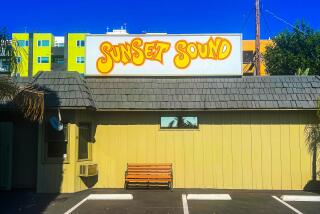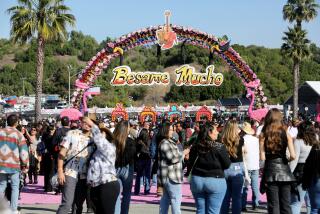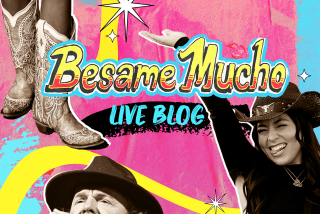‘Acoustic protection’ in Madrid? It’s noise to buskers’ ears
MADRID — With Spanish schools slashing their budgets for music and art, piano teacher Laura Nadal saw her income dwindling. So she hit the streets of her native Madrid, playing an electric keyboard and singing for extra cash.
On weekends, Nadal, along with her mandolin-strumming friend Gerardo Yllera, perform quirky tunes as the Potato Omelette Band, setting up beach chairs, umbrellas and a battery-powered amplifier on city sidewalks.
With more than a quarter of the nation’s workforce unemployed and many others such as Nadal underemployed, Spain’s streets have swelled with buskers seeking to supplement their diminished incomes or government benefits. In Madrid, subway tunnels reverberate with soulful serenades, fresh mariachi bands pop up almost daily in city squares, and dueling saxophones belt out the blues in Buen Retiro Park.
But even this meager source of cash could soon dry up for many performers in the nation’s capital. Citing a need for “acoustic protection,” the Madrid City Council has enacted a law that will limit the number of street musicians and the volume of their music. Most controversially, the rule, which takes effect on New Year’s Day, requires buskers to audition for free one-year licenses.
Those who don’t pass muster — a subjective decision by a three-member panel of civil servants — could face fines for disturbing the peace. Buskers who’ve been fiddling, singing and strumming here for years, without needing permission to hold out a hat in the street, are angry.
“People know this city because of its life — its night life, day life, music on the streets, happy people,” said Nadal, 30, who grudgingly performed a five-minute audition this month before a municipal secretary and two music instructors at Madrid’s Conde Duque Cultural Center. “We don’t know why the city mayor wants us to be sad and to not do art.”
Mayor Ana Botella has said she received noise complaints from residents of Madrid’s dense medieval center, where amplified music ricochets around stone plazas packed with tourists. With its traffic and construction noise, Madrid’s daily decibel levels are higher than what is considered safe by the World Health Organization.
“We want to offer the best impression possible to tourists and allow local residents to get their rest too,” David Erguido, a Madrid City Council member, told reporters when the regulation was proposed in October.
The law bans all amplifiers and requires licensed buskers to remain at least 75 yards apart and to move along every two hours. Music-making is limited to the hours of 10 a.m. to 10 p.m. in winter, and until 11 p.m. in summer, with a mandatory two-hour siesta (this is Spain, after all) from 3 p.m. to 5 p.m. Permits will be required in the city center, but not in parks or on public transit.
For some musical Madrileños, the idea of auditioning to sing in the street is an insult, particularly when city officials have set themselves up as arbiters of taste as well as of noise levels.
“The street is the only place where you can go,” said Potato Omelette member Yllera, 33. “So if you can’t sing in the street now, what are you going to do?”
Unlike London or New York, among others, Madrid has never before regulated its buskers, and the new rules make it difficult for some to even apply for a permit. A majority have historically been Roma, also known as Gypsies, many of whom speak limited Spanish and live in relative poverty. After notice was issued of an open call for this month’s auditions, musicians were asked to register for a time slot via the Internet, to which many Roma do not have access.
Madrid is not the first Spanish city to regulate buskers. In the coastal city of Valencia, buskers are banned altogether. Barcelona began granting permits, based on auditions, in 2004.
In Madrid, the city offered no guidance on how to nail the audition. “We will insist on a minimum standard of quality,” Erguido said.
“The audition was a joke. You arrive, and you’re told, ‘OK, you have five minutes. Play!’” said Carlos Gomez, who wears a black cowboy hat and leads a Creedence Clearwater Revival cover band. “Afterward I asked the judges, ‘When will I hear back, and how?’ They didn’t even know themselves.”
Gomez learned from a reporter about a Web page to check whether he’d passed. (He had.) Of 460 musicians who auditioned, 318 received permits, about a 70% success rate. Scores more who heard about the auditions only after the deadline remain on waiting lists.
When it was the Potato Omelette Band’s turn, Nadal and Yllera hid a video camera in their amplifier to secretly record their audition. They changed the lyrics of a popular song to include a critique of Madrid’s mayor and her policies.
“Oh, my poor Madrid, my city! They are kicking out musicians and artists, and replacing them with police,” Nadal sang. “There is no jury better than the hat — the hat you put on the ground to collect donations.”
That stealth video has been viewed several hundred thousand times on YouTube. Nadal and Yllera have become celebrities of sorts, the faces of opposition to Madrid’s noise-reduction law. Their street performances draw crowds now, and they are planning to go on tour in the new year.
At one recent impromptu concert in Madrid’s central Puerta del Sol square, the duo dedicated their performance to the mayor. They were feeling giddy, having just received the news: They were granted a one-year busking permit.
Frayer is a special correspondent.
More to Read
Start your day right
Sign up for Essential California for news, features and recommendations from the L.A. Times and beyond in your inbox six days a week.
You may occasionally receive promotional content from the Los Angeles Times.






